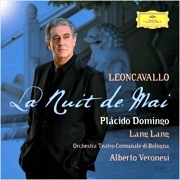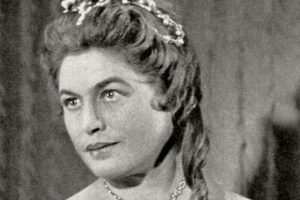
This month Deutsche Grammophon will scrape the bottom of the barrel and present a new recording
of Leoncavallo’s genre-bending “symphonic poem for tenor and orchestra” La Nuit de Mai, studded with stars Plácido Domingo and Lang Lang.
Dark horse Alberto Veronesi conducts — indeed, the same Muti-maned steed who was recently announced to succeed Eve Queler as music director of the Opera Orchestra of New York in 2011.
The release is a chance for Domingo to cut yet another notch into his belt, adding a long and demanding work to his already enormous recorded repertoire. But the addition of a second recording of the piece (which was first put on wax in 1990 by tenor Salvatore Fisichella and conductor Nello Santi) seems unjustified, especially in an age of such slender production in the recording industry.
The lengthy symphonic poem, a quasi song cycle on French-language verses by Alfred de Musset, oozes with Romantic imagery of the Poet and his Muse. Domingo sounds plausible as a tenor here, with most of his famous luster. His rolled R’s do not detract from a suave command of the French, but the verses pass by with a wan and tiresome sameness.
Veronesi exhibits the right feel for Leoncavallo’s languid kitsch. The orchestra of the Teatro Communale di Bologna shows them to be solid if not top-tier, and they handle the extended orchestral passages (such as the Berliozian 7th Movement “Allegro con fuoco” ) with sober authority.
Pianist Lang Lang gets top billing for his cameo playing the concertante piano passages (even though the prominent zither part that mucks up the orchestration is unattributed.) Filling out the balance of the disc, Lang accompanies Domingo in an assortment of Leoncavallo’s songs and even offers a pair of cute walzes for piano solo. A Universal press release calls this Lang’s “first recorded collaboration with a singer.” I can only imagine how long the opera world has been waiting for this day.
The songs become, marginally, the more satisfying bits on this album. Lang’s muscular accompaniment of Domingo in “Ecco Aprile!” shows his enthusiasm, while his cascading arpeggios decorate “Hymne à la Lyre” with the requisite dynamism. But don’t look too long for subtleties or poetry in these performances — and don’t blame the artists! For the songs have little gold to mine.

























Comments